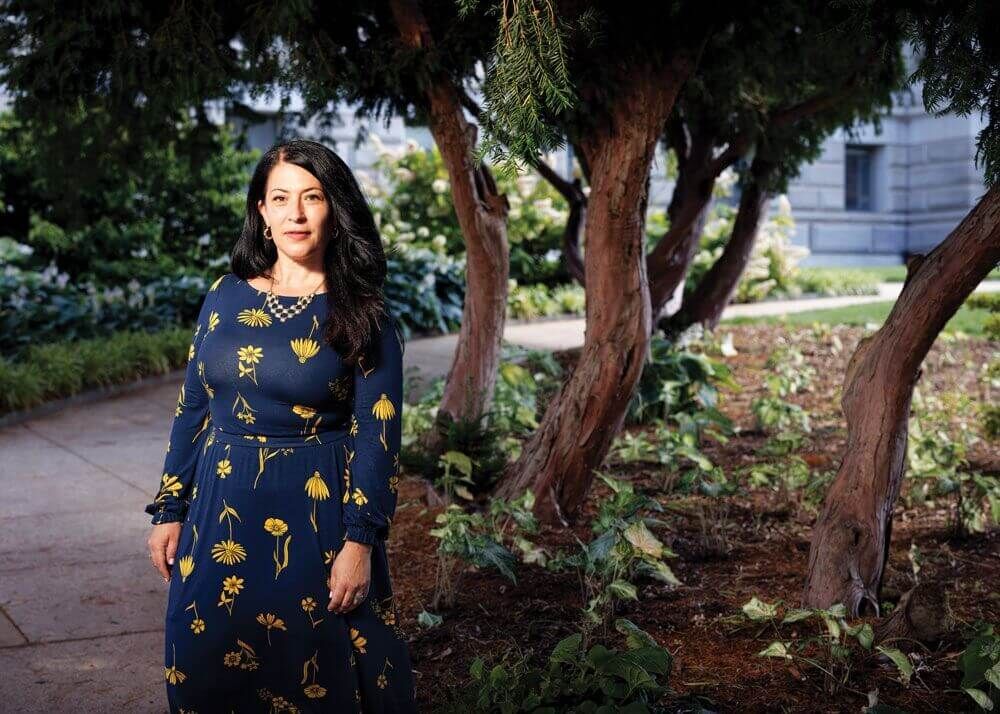Ada Limón was just named the 24th U.S. Poet Laureate in July. Here, writer/actor Amber Tamblyn speaks with her about this huge honor and how poetry can change the world:
Mexican-American poet Ada Limón has long been the not-so-secret weapon of the poetry world—a powerhouse writer who belongs to the people. For two decades, Limón’s work has spoken directly to the hearts of our humanity, making us feel like we belong to her poems, and that, somehow, her poems also belong to us. Through her six poetry collections—one of which, The Carrying, won the National Book Critics Circle Award for Poetry—she has conjured the collective grief, joy, rage, and curiosity of a nation’s subconscious. Now, as our 24th U.S. Poet Laureate, the 46-year-old will take her singular voice to the national stage and let it do what it does best: be a salve for a bruised and hurting country in need. I caught up with Limón, a friend I’ve known for over 10 years, to talk about her new laureateship, what still gives her hope, and what comes next, for the country and for poetry.
Where did it all begin for you? How old were you when you wrote your first poem?
I’ve always loved language. Recently, my father was telling my friend how I didn’t learn to speak word by word, but rather I mimicked the music of conversation. I was probably just seven or eight when I wrote my first poem. In my final year of college, at the University of Washington, I started taking poetry while studying theater and everything suddenly clicked for me. I had spent so much time learning how to speak someone else’s language, to embody a character, and now I was asked to speak my own language—to embody myself, wholly and completely. Writing poetry felt like a new type of freedom.
You were just sworn in at a celebration in D.C. as our next U.S. Poet Laureate. What was the experience like?
It was one of the most monumental moments of my lifetime. There was a standing-room-only crowd at the inaugural reading, and I had the pleasure of bringing close friends and family to the reading rooms in the Library of Congress. There I was standing with my father holding Walt Whitman’s walking stick—totally mind-blowing. I was invited to the White House twice, and the first lady even quoted my poem, “Dead Starts,” during a Hispanic Heritage Month Celebration. The whole week was shiver-inducing.
What do you hope to achieve with your laureateship?
I hope to help people recognize what poetry can do, what its power is, and how it can change us. So much of our lives lately has been about numbing out the world. What I’d love to focus on is how poetry reminds us that we are feelers, not just doers or survivors, but thinking, feeling, human beings experiencing this particular moment in time.
How can poetry change the way we view the world and the brutal politics of our time?
I ask myself that question a lot—can poetry change the world? And often what I come to is, of course it can, because it changes us. I have been changed by a poem many times. I have been moved to tears or laughter, or just gone into the day holding another type of light. I am staring at a tree right now as I answer this, and it’s shivering with fall light and it feels very alive. Even that deep looking—the way a poem can describe blades of grass or the nest built under the freeway overpass—can change us. It changes us because it makes us notice, it makes us watch, and maybe, if we are lucky, even love, the world.
What gives you hope?
There are two things that I return to when I am at a loss for hope: human kindness and the natural world. I think of how many people help one another, go out of their way to be kind, to offer aid, to reach out a hand—that always brings me hope. And then I think of how nature often regenerates and how it goes on, in its own way, and sometimes without us in mind, it goes on; it’s powerful and dangerous and also wondrous and wild. That brings me hope because it shows that nature will find a way, and if nature can find a way, so can we, because we are nature.
Top Photo by Shawn Miller, Library of Congress
This article originally appeared in BUST’s Winter 2022-2023 print edition. Subscribe today!


